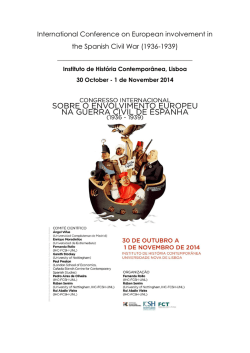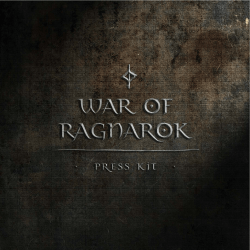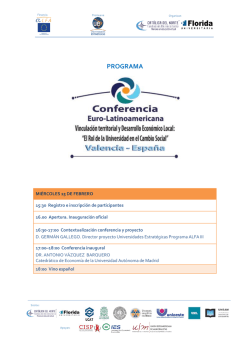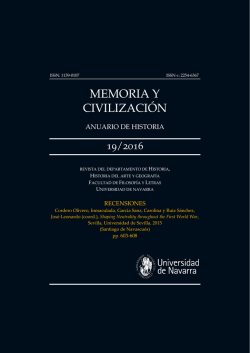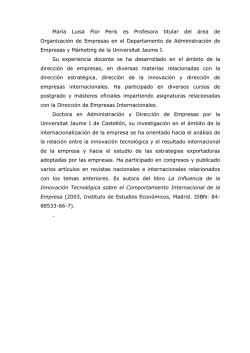
Congreso Internacional - Universitat Autònoma de Barcelona
Congreso Internacional | International Conference | Congrés Internacional Teatros de lo Bélico: experiencias de guerra y posguerra en las sociedades europeas (1895-1953) Theatres of War: War and Postwar Experiences in European Societies (18951953) Teatres bèl·lics: experiències de guerra i postguerra a les societats europees (1895-1953) — 18-19-20 nov. 2015 — Universitat Autònoma de Barcelona — Coordinador científco | Scientifc Coordinator | Coordinador científc Javier Rodrigo Comité organizador | Organizing Committee | Comitè Organitzador Miguel Alonso, Fran de Paula Fernández, David Alegre — PROGRAMA | PROGRAMME | PROGRAMA 18 NOV Miércoles | Wednesday | Dimecres [Sala d'Actes, Facultat de Filosofa i Lletres] 11:00-13:00 Conferencia inaugural | Opening lecture | Conferència inaugural John Horne (Centre for War Studies, Trinity College Dublin) The Changing Face of War in the 20th Century — Primera Sesión | First Panel | Primera Sessió [Sala de Juntes, Facultat de Filosofa i Lletres] La vida cotidiana durante la guerra | The Alltagsgeschichte During the War | La vida quotidiana durant la guerra 16:00-17:30 Conferencia | Lecture | Conferència Joan Serrallonga (Universitat Autònoma de Barcelona) El amparo que nunca existió. Los civiles en la ‘zona rebelde’ durante la GuerraCivil Española de 19361939 17:30-18:00 Pausa café | Coffee Break | Pausa cafè 18:00-20:00 Debate de comunicaciones | Papers discussion | Debat de comunicacions Relatores | Discussants | Coordinadors Maximiliano Fuentes Codera (Universitat de Girona) Assumpta Castillo Cañiz (Universitat Autònoma de Barcelona) Jorge BALLESTEROS MARÍN (USAL): De espejismos marmóreos a realidades escombrosas: la cotidianidad bajo las bombas en la capital del Reich. Carolina GARCÍA SANZ (EEHAR-CSIC): Is the reason of the strongest power in fact the best? Civilian Perceptions of British Naval Retaliation in Italy during the Great War José Miguel HERNÁNDEZ BARRAL (Centro Universitario Villanueva, UCM): Élite en guerra: la nobleza y su decadencia a través del conficto bélico Francisco Javier MARTÍNEZ ANTONIO (Université Paris Diderot): Medicine under the bombs: diseases, epidemics and health care of civilians and prisoners in Marocco’s Rif during the war of 1921-1927 Monica MORALES FLORES (CUCSH, Universidad de Guadalajara): La Guerra Civil Española en la prensa mexicana. Una nueva mirada al conficto a través de las imágenes publicadas en el diario El Nacional Burkhard OLSCHOWSKY (Federal Institute for Culture and History of the Germans in Eastern Europe): Hope, fear, trauma. Perceptions of the Red Army and the processing of World War II in Poland and the Soviet Occupation Zone Mercedes PEÑALBA SOTORRÍO (Centre for War Studies, UCD): La II Guerra Mundial en el diario Arriba o cómo la propaganda sirve a la política Thomas ROHRINGER (Technische Universität Berlin): “Work is also a cure”: Re-Integration of War-Disabled Veterans in the Habsburg Monarchy 1914-1918 Liubov ZHVANKO (Universidad de Jarkov): The Displaced Persons of the Great War: sociopsychological problems of refugees (1914-1924) — 19 NOV Jueves | Thursday | Dijous [Sala de Juntes, Facultat de Filosofa i Lletres] Segunda Sesión | Second Panel | Segona Sessió Las Postguerras | Postwars | Les Postguerres 09:30-11:00 Conferencia | Lecture | Conferència Pierre Purseigle (Trinity College Dublin/University of Warwick) The Meaning of Reconstruction, 1914-1939 11:00-11:30 Pausa café | Coffee Break | Pausa cafè 11:30-13:30 Debate de comunicaciones | Papers discussion | Debat de comunicacions Relatores | Discussants | Coordinadors José María Faraldo (Universidad Complutense de Madrid) Francisco J. Leira (Universidade Santiago de Compostela) Xavier BOLTAINA BOSCH (Universitat de Barcelona): La infuencia del estamento militar en la concepción de la política tras la II Guerra Mundial y la Guerra de Corea: el supuesto de Corea del Norte Roberto COLOZZA (Uni. Carlos III): Red Republics. WWII and Nation within the Communist Propaganda in Italy and France (1941-1953) Gabriele DIETZE (Humboldt Universität, Berlín): Dada, War and Psychiatry – theatrical performances of trauma Árpad HORNYÁK (Universidad de Pécs, Hungría): Political, social, and national (re)construction of Vojvodina after the Second World War, 1944-1946 Lisa PAYNE OSSIAN: The Grimmest Spectre: The Violence Surrounding the Emergency Famine of 1946 David TAL (University of Sussex): The Israeli Defence Force (IDF) and the Making of Nation Dmitar TASIĆ (Centre for War Studies - UCD): Prolonged Struggle – Who were the paramilitaries in the Balkans after the Great War? F. Miquel DE TORO (UAB): La resistencia anti-nazi como “mito fundacional” de la República Federal de Alemania y la memoria del Nacionalsocialismo, 1944-2014 — [Sala de Juntes, Facultat de Filosofa i Lletres] Tercera Sesión | Third Panel | Tercera Sessió Las Postguerras Postwars | Les Postguerres La identidad de los combatientes en la modernidad | Combatant’s identity in the modernity | La identitat del combatent en la contemporaneïtat 16:00-17:30 09:30-11:00 Conferencia | Lecture | Conferència Sönke Neitzel (London School of Economics/Universität Potsdam) Fighting, Killing and Dying: Remarks about the Identity of the Combatants in WWII 17:30-18:00 Pausa café | Coffee Break | Pausa cafè 18:00-20:00 Debate de comunicaciones | Papers discussion | Debat de comunicacions Relatores | Discussants | Coordinadors José Luis Ledesma (Universidad Complutense de Madrid) Miguel Alonso Ibarra (Universitat Autònoma de Barcelona) Jonathan BLACK (Kingston University): The First World War British Soldier (‘Tommy’) as ‘Implacable War Machine’ in British War Art and War Memorial Sculpture of the 1920’s Christian BRUN y Camille BRUN: Disciplinary dimension in the First World War 14-18: writers testimonials Ugo Pavan DALLA TORRE (Università di Torino): Comparing Crippled Soldiers’ Postwar Experiences in Italy: Italian National Association between Disabled ExServicemen (ANMIG) after World War I and II Ignacio ESCRIBANO BARTLETT (Universidad de Extremadura): Alistarse en una guerra: la División Azul y el paradigma extremeño Jan-Philipp POMPLUN (Technical University Berlin): What can Freikorps-Musterrolls tell us about Regions of Violence and Radicalisation? Simona TOBIA (University of Reading & Library of Congress, Washington): Face to Face with the Enemy. Interrogation, Interviewing and Questioning in the Second World War — 20 NOV Viernes | Friday | Divendres [Sala de Juntes, Facultat de Filosofa i Lletres] Cuarta Sesión | Fourth Panel | Quarta Sessió Lo militar en tiempos de paz | The military in times of peace | El lloc del fet militar en temps de pau 9:30-11:00 Conferencia | Lecture | Conferència Xose Manoel Núñez Seixas (Ludwig-Maximilians-Universität München/Universidade de Santiago de Compostela) Aprender, recordar, conmemorar: Culturas militares en tiempos de paz durante el siglo XX 11:00-11:30 Pausa café | Coffee Break | Pausa cafè 18:00-20:00 Debate de comunicaciones | Papers discussion | Debat de comunicacions Relatores | Discussants | Coordinadors Ángel Alcalde (European University Institute) David Alegre Lorenz (Universitat Autònoma de Barcelona) Alfonso BERMÚDEZ MOMBIELA (Universidad de Zaragoza): La Guerra de Marruecos en el proceso de la nacionalización española John E. FAHLEY (Purdue University): Przemyśl, Galitzia: A Garrison Town Before, During, Between and After War (1895-1953) Antonio HORTA FERNANDES (CHAM/UNL Researcher): La guerra subversiva como una nueva tipología de guerra: el caso portugués Yiannis KOKOSALAKIS (University of Edinburgh): Political activism and Soviet civil-military relations: The Communist Party in the Baltic Fleet, 1926-1941 Jacopo LORENZINI (Università degli Studi di Siena): Building the state through the army: a social, cultural and ideological portrait of the Italian military élite before the Great War — 13:30-14:00 Clausura | Concluding Remarks | Comentari fnal Javier Rodrigo (Universitat Autònoma de Barcelona)
© Copyright 2026
